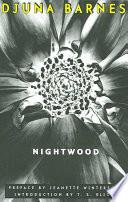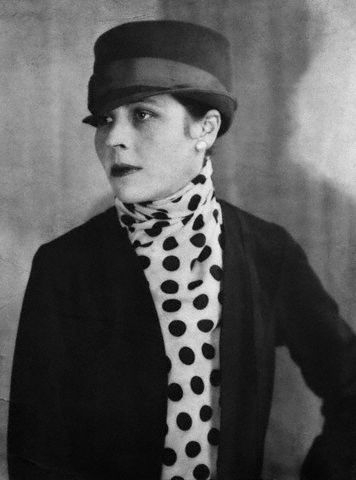Works

Nightwood
Djuna BarnesFamous Djuna Barnes Quotes
“The unendurable is the beginning of the curve of joy.”
Source: Nightwood
“We are adhering to life now with our last muscle — the heart.”
Quoted in "The Way of Transition : Embracing Life's Most Difficult Moments" (2002) by William Bridges, p. 204
Djuna Barnes Quotes about love
“I have been loved,' she said, 'by something strange, and it has forgotten me.”
Source: Nightwood
Letter to Emily Holmes Coleman (2 February 1934) http://www.case.edu/artsci/engl/VSALM/mod/brandelmcdaniel/index/library.htm
What Do You See, Madam? (1932)
Context: If Helen of Troy could have been seen eating peppermints out of a paper bag, it is highly probable that her admirers would have been an entirely different class.
It is the thing you are found doing while the horde looks on that you shall be loved for — or ignored.
Djuna Barnes Quotes about life
The Home Club: For Servants Only, in the Brooklyn Daily Eagle (12 October 1913)
“Life is not to be told, call it as loud as you like, it will not tell itself.”
Source: Nightwood (1936), Ch. 7 : Go Down, Matthew
“One's life is peculiar to one's own when one has invented it.”
Source: Nightwood (1936), Ch. 6 : Where the Tree Falls
“This life I write and draw and portray is life as it is, and therefore you call it morbid.”
When asked why she is "so dreadfully morbid", in an interview with Guido Bruno (December 1919) http://www.case.edu/artsci/engl/VSALM/mod/brandelmcdaniel/index/interviews.htm
Context: Morbid? You make me laugh. This life I write and draw and portray is life as it is, and therefore you call it morbid. Look at my life. Look at the life around me. Where is this beauty that I am supposed to miss? The nice episodes that others depict? Is not everything morbid? I mean the life of people stripped of their masks. Where are the relieving features? Often I sit down to work at my drawing board, at my typewriter. All of a sudden my joy is gone. I feel tired of it all because, I think, "What's the use?" Today we are, tomorrow dead. We are born and don't know why. We live and suffer and strive, envious or envied. We love, we hate, we work, we admire, we despise. … Why? And we die, and no one will ever know that we have been born.
Djuna Barnes Quotes
“What is a ruin but time easing itself of endurance? Corruption is the Age of Time.”
Source: Nightwood (1936), Ch. 6 : Where the Tree Falls
Context: In the acceptance of depravity the sense of the past is most truly captured. What is a ruin but time easing itself of endurance? Corruption is the Age of Time.
“And friends and relatives disperse,
And are not stirred.”
From Third Avenue On
The Book of Repulsive Women (1915)
Context: Somewhere beneath her hurried curse,
A corpse lies bounding in a hearse;
And friends and relatives disperse,
And are not stirred.
To a Cabaret Dancer
The Book of Repulsive Women (1915)
Context: p>We watched her come with subtle fire
And learned feet,
Stumbling among the lustful drunk
Yet somehow sweet. We saw the crimson leave her cheeks
Flame in her eyes;
For when a woman lives in awful haste
A woman dies. The jests that lit our hours by night
And made them gay,
Soiled a sweet and ignorant soul
And fouled its play.</p
Greenwich Village as It Is, in Pearson’s Magazine (October 1916)
“I’m a fart in a gale of wind, a humble violet, under a cow pat.”
Source: Nightwood (1936), Ch. 5 : Watchman, What of the Night?
“Destiny and history are untidy.”
Source: Nightwood (1936), Ch. 6 : Where the Tree Falls
From Fifth Avenue Up
The Book of Repulsive Women (1915)
“There is always more surface to a shattered object than a whole.”
In a letter to Emily Coleman, as quoted in The Book of Repulsive Women and Other Poems : Selected Poems (2003), edited by Rebecca Loncraine, p. xi
Source: Nightwood (1936), Ch. 5 : Watchman, What of the Night?
“Of course I think of the past and of Paris, what else is there to remember?”
In a 1960 letter to Natalie Barney, as quoted in Paris Was a Woman (1995) by Andrea Weiss, p. 173 http://www.case.edu/artsci/engl/VSALM/mod/brandelmcdaniel/index/library.htm
“What turn of card, what trick of game
Undiced?
And you we valued still a little
More than Christ.”
In General
The Book of Repulsive Women (1915)
“The night is a skin pulled over the head of day that the day may be in torment.”
Source: Nightwood (1936), Ch. 5 : Watchman, What of the Night?
Becoming Intimate with the Bohemians, New York Morning Telegraph Sunday Magazine (19 November 1916)
“What turn of body, what of lust
Undiced?
So we've worshipped you a little
More than Christ.”
In Particular
The Book of Repulsive Women (1915)
“After all, it is not where one washes one’s neck that counts but where one moistens one’s throat.”
Greenwich Village as It Is, in Pearson’s Magazine (October 1916)
“A strong sense of identity gives man an idea he can do no wrong; too little accomplishes the same.”
Source: Nightwood (1936), Ch. 7 : Go Down, Matthew
“Dreams have only the pigmentation of fact.”
Source: Nightwood (1936), Ch. 5 : Watchman, What of the Night?
From Third Avenue On
The Book of Repulsive Women (1915)
"The Songs of Synge: The Man Who Shaped His Life as He Shaped His Plays", in New York Morning Telegraph (18 February 1917)
Twilight of the Illicit
The Book of Repulsive Women (1915)
